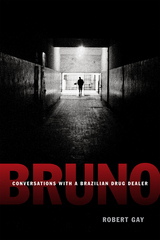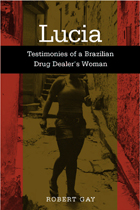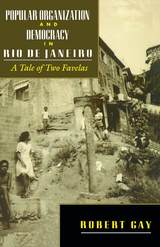3 books by Gay, Robert

Bruno
Conversations with a Brazilian Drug Dealer
Robert Gay
Duke University Press, 2015
In the 1980s a poor farmer's son from Recife, Brazil, joined the Brazilian navy and began selling cocaine. After his arrest in Rio de Janeiro he spent the next eight years in prison, where he joined the Comando Vermelho criminal faction and eventually became one of its leaders. Robert Gay tells this young man's dramatic and captivating story in Bruno. In his shockingly candid interviews with Gay, Bruno provides many insights into the criminal world in which he lived: details of day-to-day prison life; the inner workings of the Brazilian drug trade; the structure of criminal factions; and the complexities of the relationships and links between the prisons, drug trade, gangs, police, and favelas. And most stunningly, Bruno's story suggests that Brazilian mismanagement of the prison system directly led to the Comando Vermelho and other criminal factions' expansion into Rio's favelas, where their turf wars and battles with police have terrorized the city for over two decades.
[more]

Lucia
Testimonies Of A Brazilian
Robert Gay
Temple University Press, 2005
Favelas, or shantytowns, are where cocaine is mainly sold in Rio de Janeiro. There are some six hundred favelas in the city, and most of them are controlled by well-organized and heavily armed drug gangs. The struggle for the massive profits from this drug trade has resulted in what are increasingly violent and deadly confrontations between rival drug gangs and a corrupt and brutal police force, that have transformed parts of the city into a war-zone. Lucia tells the story of one woman who was once intimately involved with drug gang life in Rio throughout the 1990s. Through a series of conversations with the author, Lucia describes conditions of poverty, violence, and injustice that are simply unimaginable to outsiders. In doing so, she explains why women like her become involved with drugs and gangs, and why this situation is unlikely to change.
[more]

Popular Organization and Democracy in Rio De Janeiro
A Tale of Two Favelas
Robert Gay
Temple University Press, 1993
"Robert Gay's study is well done. It provides a detailed look at two different forms of popular political organization in Brazil and how they relate to the state, local people, parties, and politicians.... Gay allows the reader to catch a glimpse of the enormous varieties of ways in which popular organizations relate politics to contemporary Brazil. There is no comparable book on Latin American politics."
--Scott Mainwaring, Helen Kellogg Institute for International Studies, University of Notre Dame
This urban tale of survival illustrates two versions of active, organized, aggressive participation in the political process.
Vila Brasil survives by exchanging votes for favors. The president of its neighborhood association promises political candidates that the favela will vote in masse for the highest bidder. Vila Brasil has maneuvered this power to become one of the best served favelas in the region--for the moment, at least.
Vidigal, on the other hand, steadfastly refuses to support candidates who campaign on boasts or promises alone. Vote-selling, or buying, is not permitted. To do well in Vidigal, a politician must talk not only about providing electricity and water in the favela, but also about wages, education, and health care over the longer term.
In analyzing the favela's different responses to the popular movement that confronted the military in Rio de Janeiro in the late 1970s and early 1980s, the author makes a significant contribution to literature about relationships among urban poor, political elites, and the state.
[more]
READERS
Browse our collection.
PUBLISHERS
See BiblioVault's publisher services.
STUDENT SERVICES
Files for college accessibility offices.
UChicago Accessibility Resources
home | accessibility | search | about | contact us
BiblioVault ® 2001 - 2024
The University of Chicago Press









